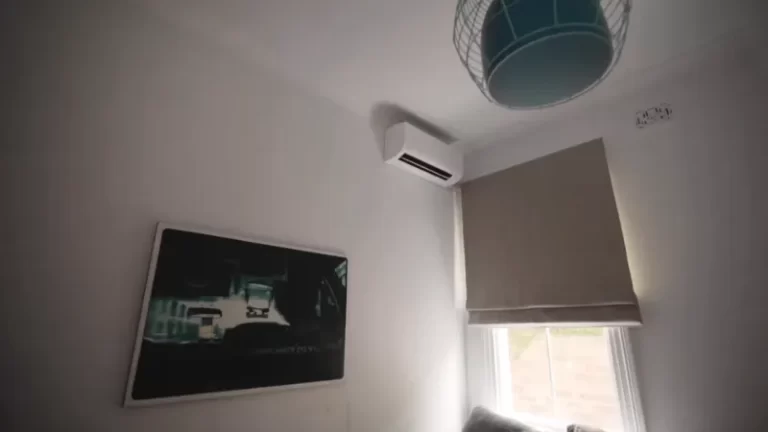GE Profile Refrigerator Noise Problems and Solutions
GE Profile refrigerators are well known for their innovative features and stylish design. However, one common problem that many GE Profile refrigerator owners face is noise. A noisy refrigerator can be incredibly disruptive to the peace and quiet of your home, especially if it’s in a shared living space.
In this article, we will provide an overview of the common GE Profile refrigerator noise problems and the solutions to fix them. Whether you’re hearing a loud hum, a jackhammer noise, or a knocking sound, we have got you covered.
You'll Learn About
Ge Profile Refrigerator Noise Problems
GE Profile refrigerators are known to have noise problems at times. Some common causes of noise in GE Profile refrigerators are a faulty compressor, a loose door seal, a drain pan that is not secured, refrigerant after a defrost cycle, and a water inlet valve that has developed an internal mechanical fault.
In order to fix these problems, the faulty component needs to be replaced or the drain pan needs to be secured. If the noise is caused by a refrigerant after a defrost cycle, it is a normal sound and doesn’t require any action.
If the noise is like a jackhammer, it is advised to turn off the ice maker and wait for some time to see if the noise recurs. If it doesn’t, it means the water inlet valve is the issue.
Problem 1: Faulty Compressor
Introduction to GE Profile Refrigerator Noise Problems GE Profile refrigerators are known for their stylish designs, innovative features, and reliable performance. However, one common issue that many owners face is excessive noise.
A loud refrigerator can be disruptive and annoying, especially if it’s located in a bedroom or open-concept living space. In this blog, we will explore some of the most common GE Profile refrigerator noise problems and provide solutions to help you enjoy a quiet kitchen.
The compressor is the heart of your refrigerator, responsible for moving refrigerant throughout the cooling system. If the compressor is not working correctly, it can cause a loud noise and impact the performance of your appliance. Here’s what you need to know about a faulty compressor:
The Compressor’s Role in a Refrigerator
The compressor is the engine that drives the refrigerant through the cooling system. It compresses the refrigerant gas, converting it into a high-pressure, high-temperature vapor. This vapor is then sent to the condenser, where it releases heat and cools down, returning to its liquid form.
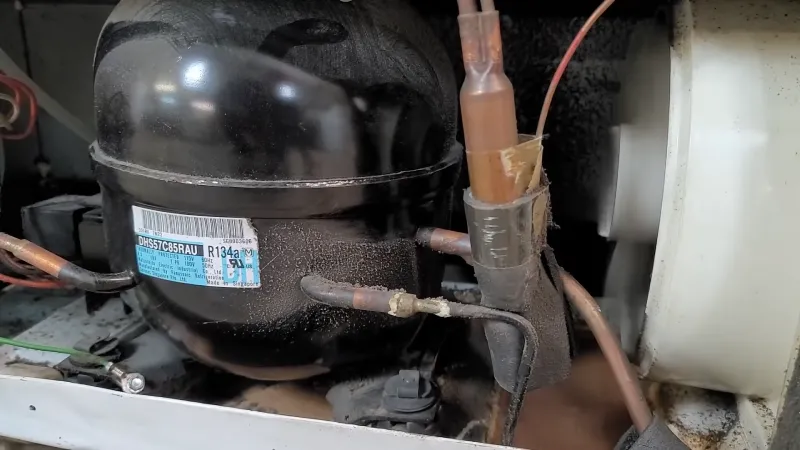
Signs of a Faulty Compressor
If you hear a loud buzzing, clanging, or knocking sound coming from your refrigerator, it could be a sign of a faulty compressor. Additionally, you may notice the following symptoms:
- The refrigerator is not cooling properly
- The lights are flickering
- The unit is overheating
- The compressor is running continuously
Solution to the Problem: Replacement of the Compressor
If you suspect that your GE Profile refrigerator’s noise is due to a faulty compressor, you will need to replace it. This is a complex job that should be done by a qualified technician. A new compressor will restore the cooling performance of your refrigerator and eliminate the loud noise.
Conclusion GE Profile refrigerators are known for their quality, but like any appliance, they can experience noise problems. If your GE Profile refrigerator is making a loud noise, it could be due to a faulty compressor or another issue.
In this blog, we have outlined the most common GE Profile refrigerator noise problems and provided solutions to help you keep your kitchen quiet. If you’re still having trouble with your appliance, consider contacting a professional technician for assistance.
Problem 2: Loose Door Seal
The door seal is an essential part of a refrigerator. It helps to keep the cold air inside the refrigerator and prevent warm air from entering. This helps to maintain the temperature inside the refrigerator, which is crucial for keeping food fresh and preserving its taste.
A faulty door seal can cause the refrigerator to work harder and make more noise than it should.
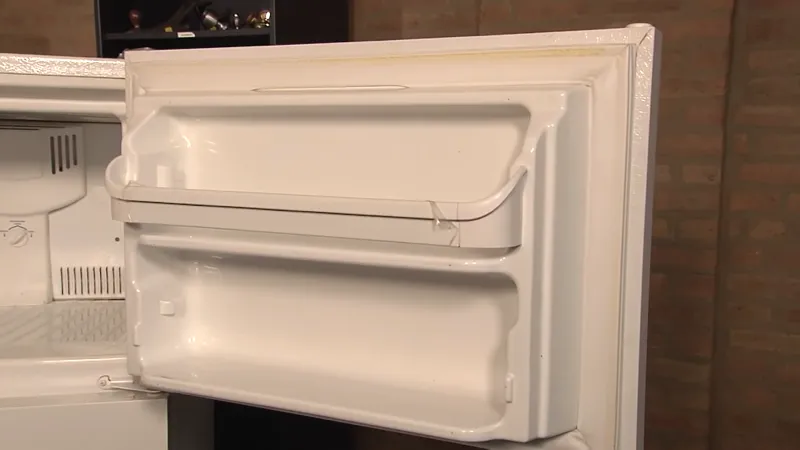
Signs of a Loose Door Seal
There are several signs that indicate a loose door seal. Some of the most common include:
- Warm air entering the refrigerator: If you notice that the inside of your refrigerator is not as cold as it should be, it could be a sign of a loose door seal.
- Increase in energy bills: A loose door seal can cause your refrigerator to work harder to maintain the temperature inside, leading to an increase in energy bills.
- Condensation buildup: If you notice condensation buildup around the door of your refrigerator, it could be a sign of a loose door seal.
- Noisy operation: A loose door seal can cause the refrigeration system to make more noise as it tries to maintain the temperature inside.
Solution to the Problem
Tightening or Replacing the Door Seal
a loose door seal can cause several problems for your GE Profile refrigerator, including warm air entering the unit, increased energy bills, condensation buildup, and noisy operation. If you suspect that your refrigerator has a loose door seal, try tightening the screws or replacing the door seal to solve the problem.
Problem 3: Unsecured Drain Pan
The drain pan is an important component in a GE Profile refrigerator. It is located at the bottom of the unit and its main function is to catch any condensation or water that may form inside the refrigerator. The water collected in the drain pan then gets evaporated through the defrost system, keeping the interior of the refrigerator dry and free of mold.
Signs of an Unsecured Drain Pan
A common cause of noise in GE Profile refrigerators is an unsecured drain pan. If the drain pan is not properly secured, it can vibrate and rattle inside the unit, causing a loud noise. To identify if an unsecured drain pan is causing the noise, you can try moving the refrigerator slightly and listening for any rattling sounds.
Solution to the Problem
Securing the Drain Pan
fixing an unsecured drain pan is a relatively straightforward task that can significantly reduce noise in your GE Profile refrigerator. Regular inspections and maintenance of the drain pan can help prevent noise issues from occurring in the future.
Problem 4: Refrigerant After Defrost Cycle
The defrost cycle in a refrigerator is an essential process that helps to maintain the temperature inside the appliance. The cycle helps to prevent the buildup of ice on the evaporator coils, which is the component responsible for removing heat from the interior of the refrigerator.
During the defrost cycle, the compressor stops working, and the refrigerant starts flowing to the evaporator coils, causing a sound.
Normal Sounds Caused by Refrigerant After Defrost Cycle
Refrigerant making a gurgling or hissing noise after the defrost cycle is normal. This sound is caused by the refrigerant that is flowing through the evaporator coils to remove the ice buildup. The sound is not a cause for concern and is a normal part of the refrigeration process.
No Action Required for This Problem
The sound of refrigerant after the defrost cycle is a common and normal occurrence in GE Profile refrigerators. There is no need to take any action to address this problem, and the noise should subside within a few minutes. If the sound continues for an extended period, it could indicate a more significant problem, and it is recommended to seek professional assistance.
the refrigerant after the defrost cycle is a common noise that is normal for GE Profile refrigerators. If the sound is not excessive or accompanied by other issues, there is no need for concern, and no action is required.
Problem 5: Water Inlet Valve Issues
The water inlet valve is an important component of a refrigerator’s water dispensing system. It is responsible for controlling the flow of water from the main water supply to the refrigerator. The water inlet valve is located behind the refrigerator and is connected to the water line.
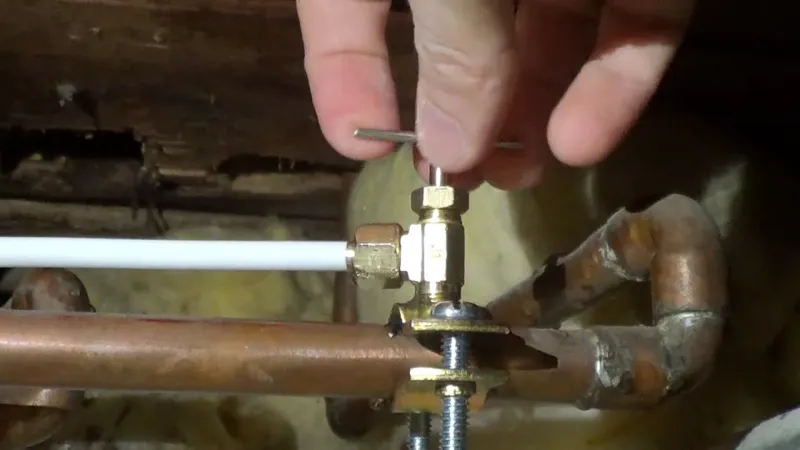
Signs of Water Inlet Valve Issues
A faulty water inlet valve can cause several problems in a refrigerator, including leakage and noise. If the water inlet valve is not functioning properly, it may cause water to leak from the dispenser or onto the floor. Additionally, a faulty water inlet valve may make a humming or buzzing noise, which can be noticeable when the dispenser is being used.
Solution to the Problem
Replacement of the water inlet valve
Once the new water inlet valve is installed, you should notice a significant reduction in noise and any leakage should stop. Regular maintenance and checking for signs of issues with the water inlet valve can help prevent these problems from occurring in the first place.
the water inlet valve is a critical component of a refrigerator’s water dispensing system, and issues with the valve can cause problems such as leakage and noise. If you experience these issues, it is important to have a qualified technician replace the valve to ensure that your GE Profile refrigerator operates quietly and efficiently.
Problem 6: Motor Issues
The motor in a refrigerator is a crucial component that is responsible for running the compressor, fan, and defrost system. It is what makes the refrigeration cycle possible, by maintaining the temperature inside the refrigerator and freezer.
Signs of Motor Issues
A faulty motor can lead to a number of issues in a refrigerator, including loud or unusual noises, warm temperatures inside the refrigerator, and a complete loss of cooling. If the motor is damaged or faulty, it can cause the refrigeration cycle to stop working, resulting in food spoilage and wasted energy.
Solution to the Problem
Replacement of the motor
Overall, a faulty motor can be a major issue for a refrigerator and can lead to a range of problems. If you suspect that your GE Profile refrigerator’s motor is causing noise, it is important to have it inspected and repaired as soon as possible to avoid further damage and ensure optimal performance.
Problem 7: Fan Issues
The fan in a refrigerator plays a crucial role in circulating cool air throughout the interior. This helps to maintain an even temperature, preventing the build-up of warm spots and ensuring food stays fresh.
Signs of Fan Issues
If the fan in your GE Profile refrigerator is not functioning properly, you may hear strange noises such as buzzing, grinding or even complete silence. Other signs of fan issues include an uneven temperature within the refrigerator, frost buildup, or a decrease in cooling performance.
Solution to the Problem
Replacement of the Fan
It is important to regularly clean and maintain your refrigerator, as this can help to prevent fan issues and extend the life of the appliance. If you are unsure about the cause of your refrigerator’s noise, or if you are uncomfortable with the repair process, it is best to contact a professional for assistance. With proper care and maintenance, your GE Profile refrigerator should provide years of quiet and reliable performance.
Problem 8: Evaporator Issues
The evaporator is a critical component in a refrigeration system as it is responsible for absorbing heat from the contents of the refrigerator. The evaporator is typically located behind the back wall of the freezer or refrigerator and operates in tandem with the compressor, condenser, and refrigerant.
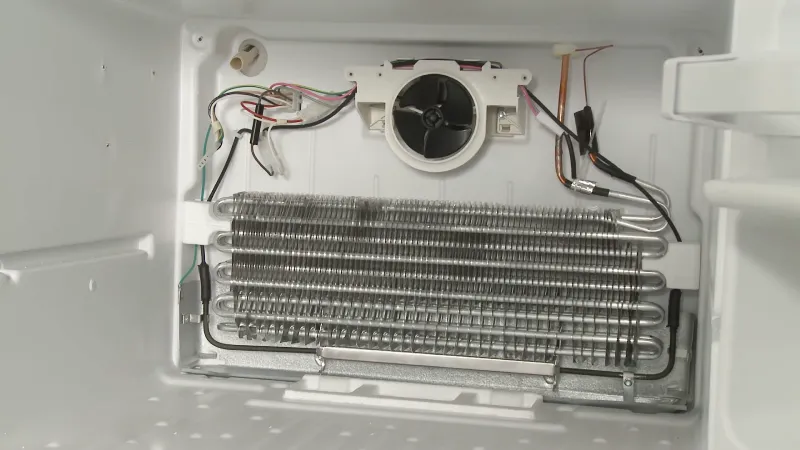
Signs of Evaporator Issues
A faulty evaporator can cause a range of issues, including unusual noises, decreased cooling efficiency, and a decrease in the overall temperature of the refrigerator or freezer. If you notice any of these signs, it may be an indication of an issue with the evaporator. Additionally, if you observe a buildup of ice on the evaporator, this could also indicate a problem.
Solution to the Problem
Replacement of the evaporator
It is important to address any issues with the evaporator promptly to ensure the proper functioning of your refrigerator and to avoid further damage to the refrigeration system. Regular maintenance and inspections can also help prevent issues with the evaporator and prolong the life of your refrigerator.
Problem 9: Condenser Issues
The condenser in a refrigerator plays a crucial role in the cooling process. It is responsible for removing heat from the refrigerant and expelling it to the outside. The refrigerant is compressed, heated, and then passed through the condenser coils where it cools down and condenses into a high-pressure, high-temperature gas.
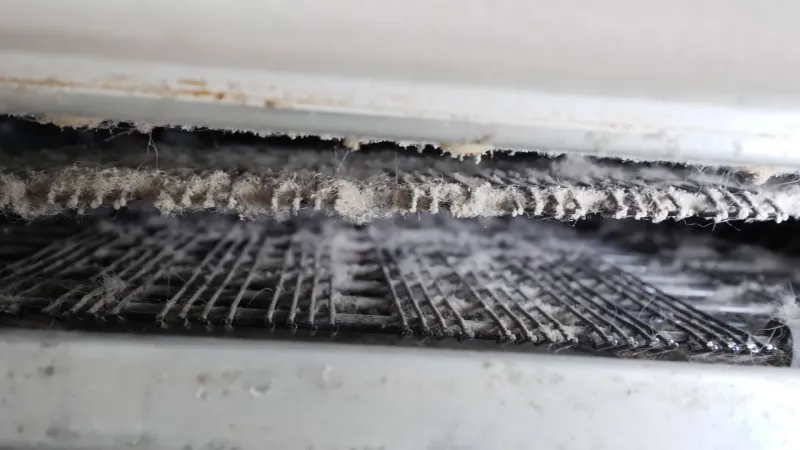
Signs of Condenser Issues
A faulty condenser can cause various problems in a refrigerator, such as excessive noise, warm interior, and reduced cooling efficiency. Some common signs of a condenser issue include:
- Loud and persistent buzzing or humming noise
- A warm interior that is not cooling properly
- High energy consumption and increased electricity bills
- Frost buildup in the freezer section
- Refrigerator turning on and off frequently
Solution to the Problem
Replacement of the condenser
A functioning condenser is essential for a properly functioning refrigerator. If you notice any issues with your condenser, it is important to address them promptly to ensure that your refrigerator is operating efficiently and effectively.
Conclusion
GE Profile refrigerators are known for their high-quality performance and sleek design, but like all appliances, they may experience noise issues. The common problems include faulty compressors, loose door seals, unsecured drain pans, refrigerant after defrost cycles, water inlet valve issues, motor problems, fan issues, evaporator problems, and condenser issues.
It is important to address these problems as soon as they arise to ensure the longevity and efficiency of your refrigerator. Regular maintenance and prompt repairs can help avoid larger and more costly issues in the future.
If you experience any unusual noises or suspect a problem with your GE Profile refrigerator, it is best to contact a professional for proper diagnosis and repair. Remember, a quiet refrigerator is a sign of a well-functioning appliance, so take care of your GE Profile refrigerator to keep it running smoothly for years to come.

